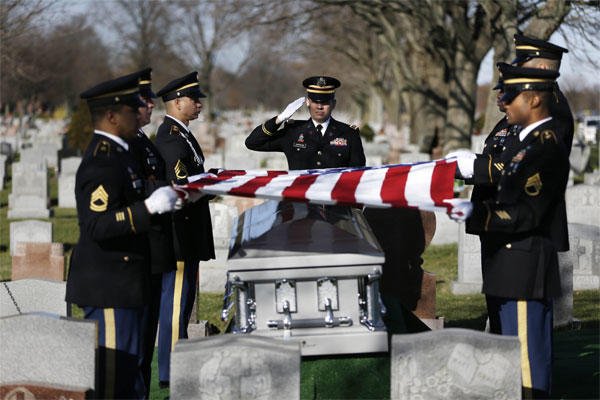It's something none of us want to think about: our demise. What will happen after we're gone? Will we have a big funeral? Will anybody show up?
If you want to have a big funeral and a fancy tombstone in a nice cemetery, it will cost a lot. That's OK. You're a veteran; the Department of Veterans Affairs will pay. Right?
Well … not so fast.
The High Cost of Dying
Before we discuss what the VA will pay, let's discuss the major costs associated with dying.
Funeral Prices
According to the National Funeral Directors Association, the average cost of a funeral with burial in 2021 was nearly $8,000; the average cost of a funeral with cremation was nearly $7,000.
That's just the cost of transporting and preparing the body, and holding a small viewing. If you want a service and a wake, expect to pay more.
Casket Prices
If you want a fancy casket, expect to pay an average of $5,000 for it. Amazon, Costco and Walmart sell caskets for less than $1,000, but some fancy ones cost more than $10,000.
If you just want to be buried in a pine box, be sure to check local laws. Some states don't allow that.
Cemetery Prices
The cemetery will cost you even more.
While some states allow you to be buried in biodegradable caskets and some even have natural burial preserves where they allow you to be buried in the woods, most don't.
A burial plot in a public cemetery will cost between $200 and $2,000. If you want to be buried in a private cemetery, that price can go up to $5,000 in some places. If you're in a city, the price can easily go up to $25,000 for the gravesite alone.
If you want to be cremated and have your ashes buried, expect to pay up to $2,500 for the plot.
Of course, there are additional fees. You have to pay for them to dig the hole and fill it back up; this can cost more than $3,000. Just doing the paperwork (some places require a permit to be buried) can reach up to $1,000. Some fancy cemeteries even charge a fee for "perpetual care;" this is the cost of upkeep for the cemetery -- cutting grass, planting trees, etc.
If you want a tombstone, expect to pay $500 to $5,000.
Paying the High Cost of Dying
Cemeteries aren't regulated by the federal government. They don't have to comply with the Federal Trade Commission's Funeral Rule, which requires an itemized bill allowing you to pick and choose which services you wish to buy. Some states have regulations, but many do not.
Don't expect to get a line of credit from the funeral home or cemetery, either. They want payment up front. What will they do if your family doesn't pay the bill, dig you back up?
What Will the VA Pay?
Since you're reading this, you probably are a veteran. Doesn't the VA pay for all of this?
It will pay some, but not all, of your burial costs, and probably very little of your funeral costs. Of course, all these benefits are only for veterans with at least an "other-than-dishonorable" discharge.
The VA will provide most veterans a free headstone or marker.
Most states also have programs to provide some type of burial or memorial benefits.
Burial and Plot Allowance
The VA will pay a burial allowance to an eligible veteran's family to help defray burial and funeral costs. The burial allowance is a tax-free benefit paid automatically. If you are eligible for a plot allowance the VA requires receipts to show the actual cost paid.
- If the death occurs while hospitalized by the VA, it will pay a $978 burial allowance and $978 for a burial plot.
- If the death is considered service-connected, the VA will pay a burial allowance of up to $2,000 and may reimburse some of the costs of transporting remains.
- If the death isn't service-connected, the VA pays a burial allowance of $978 and $978 for a burial plot
- For an indigent veteran with no next of kin, the VA will furnish either a casket or cremation urn for interment in either a national, state or tribal veterans cemetery.
- The Social Security Administration also will pay a death benefit of $255.
The VA's amounts usually change every year.
Cemetery
All veterans with other-than-dishonorable discharges are eligible for free burial in a national VA cemetery. Space is limited; the VA recommends you request a pre-determination of burial eligibility to avoid any delay when the time comes.
Most states have their own veterans cemeteries. Usually, the eligibility requirements are the same as for federal cemeteries.
In most cases, spouses are eligible for burial next to the veteran at little or no cost. Also, markers are provided.
Arlington National Cemetery has very limited space for burial; there is more space available for inurnment of cremated remains. Only certain veterans are eligible for burial at Arlington.
If you wish to be buried in a civilian cemetery, the VA may pay a small fee, as described earlier, for your plot allowance. It will also provide a free headstone, urn or memorial plaque. Some states also help with the cost of burial and the cost of setting a headstone.
You can always choose to be buried at sea from a Navy ship.
Whatever the case, it's a good idea to make a plan. Also, remember that the funeral director can help with a lot of this stuff. They know how to submit the paperwork to the VA, and usually how to get the most out of your state benefits as well.
Stay on Top of Your Veteran Benefits
Military benefits are always changing. Keep up with everything from pay to health care by subscribing to Military.com, and get access to up-to-date pay charts and more with all latest benefits delivered straight to your inbox.












